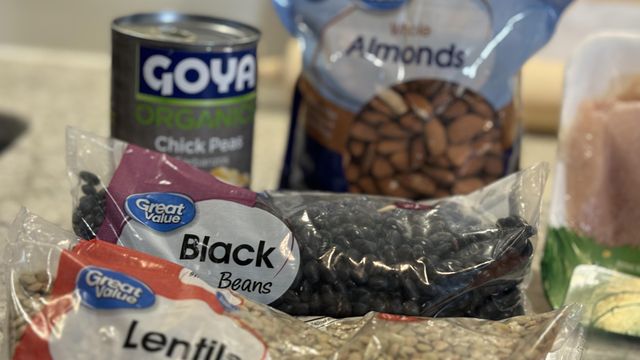New study shows swapping beef for a black bean burger could mean better health as you age
When you jot down your grocery list for the next trip to the store, data says you should consider adding more plant protein to your meal plan.
A recent study, published in the American Journal of Clinical Nutrition analyzed data collected during the Nurses’ Health Study.
The NHS began in 1988 as a way to study the relationship between breast cancer and contraception. For over 20 years, women were asked about their lifestyle and their overall health was measured for comparison.
A group of researchers recently took the data and further analyzed the diet of the women over several years. They specifically analyzed which kind of protein each person ate.
The data showed those who ate more plant protein were 46% less likely to develop eleven chronic illnesses as they aged. Increased plant-protein diets also were linked to better overall cognitive function later in life.
UNC Thrive Clinic Dietitian Elizabeth Watt said she wasn’t surprised by the results of the study because plants “typically are going to have a higher fiber content, they’re going to have more nutrients, more vitamins and minerals and typically a better healthy fat profile as well.”
Watt said the best sources of plant protein include beans, lentils, nuts, nut butters, whole grains and vegetables.
“If we even one day or one meal a week start incorporating more plant-based foods in our diet, every little bit is going to make a big difference in the long run of your health,” she said.
Watt continued, “I do think steak and red meat products all have their place, so it’s not that you have to give them up completely. I think every once in a while, swap one out for a black bean burger or try some other options that can be good substitutions that can give you more plant-based protein.”
Along with increasing your plant protein intake, Watt emphasized the importance of staying active.
“As we’re getting older we lose muscle mass if we’re not doing things to maintain that,” she said.
Watt said those with high blood pressure, elevated cholesterol and those at higher risk of developing diabetes could especially benefit from a more plant-based diet.
The dietitian said ideally you want to spread your plant protein in various meals throughout the day. If you’re struggling to get enough plant protein in each meal, adding a whey or soy protein powder could help.











